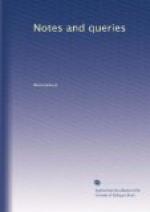I was acquainted with that good man, and my mother was his first cousin.
R.S.
Belgave, Nov. 15. 1850.
Mrs. Partington (Vol. ii., pp. 377. 411.).—In the Rev. Sydney Smith’s speech at Taunton, on the Lords’ rejection of the Reform Bill, October, 1831, is this passage:
“The attempt of the Lords to stop the progress of reform, reminds me very forcibly of the great storm of Sidmouth, and of the conduct of the excellent Mrs. Partington on that occasion. In the winter of 1824, there set in a great flood upon that town—the tide rose to an incredible height—the waves rushed in upon the houses, and everything was threatened with destruction. In the midst of this sublime and terrible storm, Dame Partington, who lived upon the beach, was seen at the door of her house with mop and pattens, trundling her mop, squeezing out the sea-water, and vigorously pushing away the Atlantic Ocean. The Atlantic was roused. Mrs. Partington’s spirit was up; but I need not tell you that the contest was unequal. The Atlantic Ocean beat Mrs Partington. She was excellent at a slop or a puddle, but she should not have meddled with a tempest.”
This speech is reprinted in the collected editions of Sydney Smith’s Works. Unless an allusion to Mrs. Partington of a prior date to October, 1831, is produced, we may fairly consider that the celebrity of that lady is owing to Sydney Smith.
I doubt if Lord Brougham ever alluded to Mrs. Partington. Certain it is he never made any speech in the House of Commons on the Reform Bill, as he was raised to the peerage some months before that bill was brought forward.
C.H. COOPER.
"Never did Cardinal bring good to England" (Vol. ii., p. 424.).—Your correspondent O.P.Q. refers to Dr. Lingard’s History of England, in which this exclamation of the Duke of Suffolk, on the adjournment of the legatine inquiry into the validity of the marriage of Henry VIII. and Catharine of Arragon, is termed an “old saw,” and remarks that he should be glad to know if this saying is to be met with elsewhere, and what gave rise to it. Before we enter upon the inquiries suggested by O.P.Q., it seems to me that we have to consider a previous question—what authority is there for terming it an “old saw.” Dr. Lingard refers to “Cavendish, 434.; Herbert, 278.” as his authorities for the whole paragraph. But Herbert does not contain anything of the kind and Cavendish relates the matter very differently:
“With that stepped forth the Duke of Suffolk from the king, and lay his commandment spoke these words with a stout and an hault countenance, ‘It was never merry in England,’ quoth he, ’whilst we had cardinals amongst us!’”—Cavendish’s Wolsey, pp. 232, 233, Singer’s edition.
Is Dr. Lingard the authority for these words being an “old saw”, or has he merely omitted to give a reference to the place from whence he really derived them?




